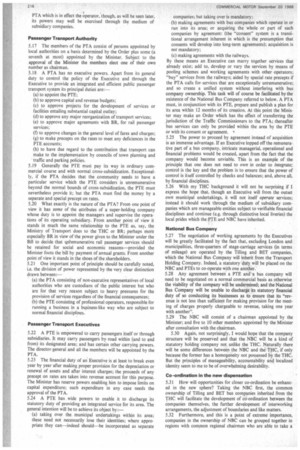Passenger Transport Authority 5.17 The members of the PTA consist
Page 220

If you've noticed an error in this article please click here to report it so we can fix it.
of persons appointed by local authorities on a basis determined by the Order plus some (a seventh at most) appointed by the Minister. Subject to the approval of the Minister the members elect one of their own number as chairman.
5.18 A PTA has no executive powers. Apart from its general duty to control the policy of the Executive and through the Executive to provide an integrated and efficient public passenger transport system its principal duties are:—
(a) to appoint the PTE; (b) to approve capital and revenue budgets; (c) to approve projects for the development of services or facilities entailing substantial capital outlay; (d) to approve any major reorganization of transport services; (e) to approve major agreements with BR, for rail passenger services; (f) to approve changes in the general level of fares and charges; (g) to make precepts on the rates to meet any deficiences in the PTE accounts; (h) to have due regard to the contribution that transport can make to the implementation by councils of town planning and traffic and parking policies.
5.19 Generally the PTE must pay its way in ordinary commercial course and with normal cross-subsidization. Exceptional ly, if the PTA decides that the community needs to have a particular service which the PTE considers is unremunerative beyond the normal bounds of cross-subsidization, the PTE must nevertheless provide it; but the PTA must find the money by a separate and special precept on rates.
5.20 What exactly is the nature of the PTA? From one point of view it has some of the attributes of a super-holding company whose duty is to appoint the managers and supervise the opera
tions of its operating subsidiary. From another point of view it stands in much the same relationship to the PTE as, say, the Ministry of Transport does to the THC or BR; perhaps more especially BR in view of the power given to the Minister under the Bill to decide that tuitemunerative rail passenger services should be retained for social and economic reasons—provided the Minister foots the bill by payment of annual grants. From another point of view it stands in the shoes of the shareholders.
5.21 One important point of principle should be carefully noted, i.e. the division of power represented by the very clear distinction drawn between:—
(a) the PTA consisting of non-executive representatives of local authorities who are custodians of the public interest but who are for that very reason subject to heavy pressures for the provision of services regardless of the financial consequences; (b) the PTE consisting of professional operators, responsible for running a business in a business-like way who are subject to normal financial disciplines.


















































































































































































































































































































































































